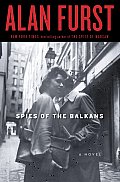Alan Furst: Spies of the Balkans
By
Jesse Kornbluth
Published: Jun 23, 2010
Category:
Fiction
It’s a bittersweet day around here when a new Alan Furst novel arrives.
On the plus side: I get to spend an entire day reading about 1939 or 1940, generally in Paris. The prose is stylish, the dialogue credible, the characters fascinating, the sex adult — Furst serves up everything I hope to find in fiction and never expect to see in a thriller. I come away with fresh knowledge about pre-war Europe. And, without fail, Furst forces me to ponder a question that no other novelist consistently flings in my face: If an “enemy” were about to invade — and, very possibly, overrun — your country, what would you do?
On the down side: Furst kills productivity. My thousand words a day? I may think I can read a chapter and stop to do some of my own writing, but it doesn’t work out that way. This shouldn’t be — the ticking clocks in Furst’s books are never about a railroad bridge that’s to be blown up at midnight or an assassination that can only succeed at noon. His skill is different: he concocts character-based thrillers.
This time around, there’s a fresh location. Paris is pretty much behind us (though there is one terrific, very atmospheric action sequence in pre-dawn Paris in these 263 pages). And Warsaw looks elegant compared to the setting of this novel — Salonika, in Northern Greece. The Balkans. When was the last time anyone went there for pleasure?
In other ways though, “Spies of the Balkans” is classic Furst. [To buy the paperback from Amazon,
click here. For the Kindle edition,
click here. For the Audio CD,
click here.] It’s 1940, the Italians have invaded and been repulsed, Hitler’s army is surely on the way.
Costa Zannis, a policeman in Salonika, is more dashing than the usual Furst anti-hero-turned-hero. He’s head of a “special” squad that deals in “delicate” situations; he’s got a big brain and a light touch. He has a mother and a dog. He’s handsome. His lover actually loves him.
Who do you go to when Jews, smuggled out of Germany, are coming through the Balkans on their way to freedom in Turkey? Costa. Who can help the British extract one of their scientists from occupied Paris? Costa. Who dares to launch a romance with the gorgeous wife of the richest man in Salonika? Costa.
And more — he’s not ambivalent. “When somebody takes your country, you help them or you fight them,” another man says in this novel. No question for Costa. He’ll fight. He can use a gun, and he does, without remorse. It’s more satisfying when he doesn’t have to.
I envy those of you who have read none of these novels. All those lovely “lost” days ahead of you.
Furst gets better with each book. If you want to start at the top, “Spies of the Balkans” should convert you to this elite cult.


